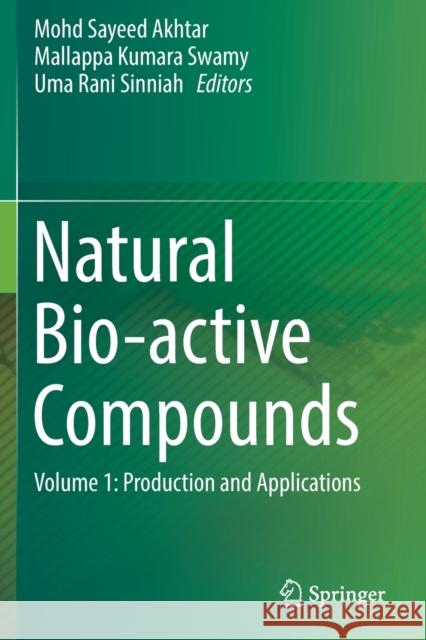Natural Bio-Active Compounds: Volume 1: Production and Applications » książka



Natural Bio-Active Compounds: Volume 1: Production and Applications
ISBN-13: 9789811371561 / Angielski / Miękka / 2020 / 608 str.
Natural Bio-Active Compounds: Volume 1: Production and Applications
ISBN-13: 9789811371561 / Angielski / Miękka / 2020 / 608 str.
(netto: 766,76 VAT: 5%)
Najniższa cena z 30 dni: 771,08
ok. 16-18 dni roboczych.
Darmowa dostawa!
Chapter 1. Production and Application of Novel of Bio-active Compounds by Endophytic Microbes.- Chapter 2. Endophytes - The Unmapped Repository For Natural Products.- Chapter 3. Microbial Hosts as a Promising Platform for Polyphenols Production.- Chapter 4. Endolichenic fungi From Common Lichens as New Sources for Valuable Bio-active Compounds.- Chapter 5. Strategic Approaches for the Purification of Glycosides from Natural Sources.- Chapter 6. Natural Products-Based Pancreatic Lipase Inhibitors for Obesity Treatment.- Chapter 7. Natural compounds extracted from medicinal plants and their applications.- Chapter 8. Seed Oils as a Source of Natural Bioactive Compounds.- Chapter 9. Essential Oils Extracted from Medicinal Plants and their Applications.- Chapter 10. Cellulose-based hydrogels: Present and Future.- Chapter 11. Influence of Elicitors and Eustressors on the Production of Plant Secondary Metabolites .- Chapter 12. KRAS as potential target in colorectal cancer therapy.- Chapter 13. Recent insights on the anticancer properties of flavonoids: Prospective candidates for cancer chemoprevention and therapy.- Chapter 14. Natural Compounds Extracted from Moringa oleifera and their Agricultural Applications.- Chapter 15. Natural compound from genus Brassica and their therapeutical activities.- Chapter 16. Antibacterial and Antifungal Agents of Higher Plants.- Chapter 17. Bio-active Compounds Isolated from Neem tree and their Applications .- Chapter 18. Role of Plant Secondary Metabolites as Antidiabetic Agents.- Chapter 19. Plant metabolites and Pharmacological activities of Leptadenia pyrotechnica (Forssk.) Decne.- Chapter 20. Functioning of Organosulfur Compounds from Garlic (Allium sativum Linn) in targeting risk factors mediated Atherosclerosis: A Crosstalk between Alternative and Modern Medicine.- Chapter 21. Biological activities and nutritional value of Physalis peruviana L.- Chapter 22. Yield, Chemical Composition and Biological Evaluation of the Essential Oil of Baccharis Milleflora in the Atlantic Rain Forest of the Paraná State in Brazil.
Dr. Mohd Sayeed Akhtar (PhD) is an Assistant Professor at Gandhi Faiz-e-Aam College, Shahjahanpur, UP, India. He received his PhD degree from Aligarh Muslim University (AMU), India in 2008, prior to conducting post-doctoral research at the Botanical Institute, University of Basel (BIB), Switzerland (2008–2010), and at Chonbuk National University (CBNU), Republic of Korea in 2011. He was an Assistant Professor at Jimma University, Ethiopia (2011-2014), and a fellow researcher at the Institute of Tropical Agriculture, Universiti Putra Malaysia (UPM), (2014-2015). Dr. Akhtar has more than 15 years of research and 10 years of teaching experience in soil microbiology, applied microbiology, environmental microbiology, molecular biology, plant pathology and plant nanobiotechnology. He has authored or co-authored more than one hundred articles in peer-reviewed journals, conference proceedings, and book chapters, and has edited 10 books with international publishers. Further, he serves as an editorial board member and reviewer for several high-impact international journals. His current research is focused on rhizospheric plant-microbe interactions and molecular biotechnology, bioremediation, biomineralization, nano-fertilizers and nanobiotechnology.
Dr. Mallappa Kumara Swamy (PhD) is a Professor and Head of the Department of Biotechnology at East West College of Science, Bengaluru, Karnataka, India. He completed his postdoctoral research at the Department of Crop Science, Faculty of Agriculture, Universiti Putra Malaysia (UPM), Serdang, Selangor, Malaysia. Before that, he had worked as an Associate Professor and Head of the Department of Biotechnology, Padmashree Institute of Management and Sciences, Bangalore University, Bengaluru, India. He received his PhD (Biotechnology) from Acharya Nagarjuna University, Guntur, India in 2013. He has more than 15 years of teaching and research experience in the fields of plant biotechnology, secondary metabolite production, phytochemistry and bioactive studies. Dr. Swamy has authored 80 research publications in peer-reviewed journals and 16 book chapters. Recently, he has edited four books published by Springer Nature Singapore Pte Ltd., Singapore. He also serves as an editorial board member and reviewer for several high-impact international journals. His current research is focused on cell and tissue culture technology for bioactive compound production, and on nanotechnology for medical applications.
Dr. Uma Rani Sinniah (PhD) is a Professor at the Department of Crop Science, Faculty of Agriculture, Universiti Putra Malaysia (UPM). She has more than 35 years of teaching and research experience in the fields of plant biology, seed technology, cryobiology, germplasm conservation, and plant secondary metabolites, and has successfully completed several projects supported by various national and international funding bodies. She has published more than 95 research articles in peer-reviewed journals, and eight book chapters. Her current research is focused on seed science and technology, cryopreservation, plant cell and tissue culture, and secondary metabolite production.
Bioactive compounds produced by natural sources, such as plants, microbes, endophytic fungi, etc., can potentially be applied in various fields, including agriculture, biotechnology and biomedicine. Several bioactive compounds have proved to be invaluable in mediating plant-microbe interactions, and promoting plant growth and development. Due to their numerous health-promoting properties, these compounds have been widely used as a source of medication since ancient times.
However, there is an unprecedented need to meet the growing demand for natural bioactive compounds in the flavor and fragrance, food, and pharmaceutical industries. Moreover, discovering new lead molecules from natural sources is essential to overcoming the rising number of new diseases. In this regard, natural bioactive compounds hold tremendous potential for new drug discovery. Therefore, this field of research has become a vital area for researchers interested in understanding the chemistry, biosynthetic mechanisms, and pharmacological activities of these bioactive metabolites. This book describes the basics of bioactive plant compounds, their chemical properties, and their pharmacological biotechnological properties with regard to various human diseases and applications in the drug, cosmetics and herbal industries. It offers a valuable asset for all students, educators, researchers, and healthcare experts involved in agronomy, ecology, crop science, molecular biology, stress physiology, and natural products.
1997-2026 DolnySlask.com Agencja Internetowa
KrainaKsiazek.PL - Księgarnia Internetowa









